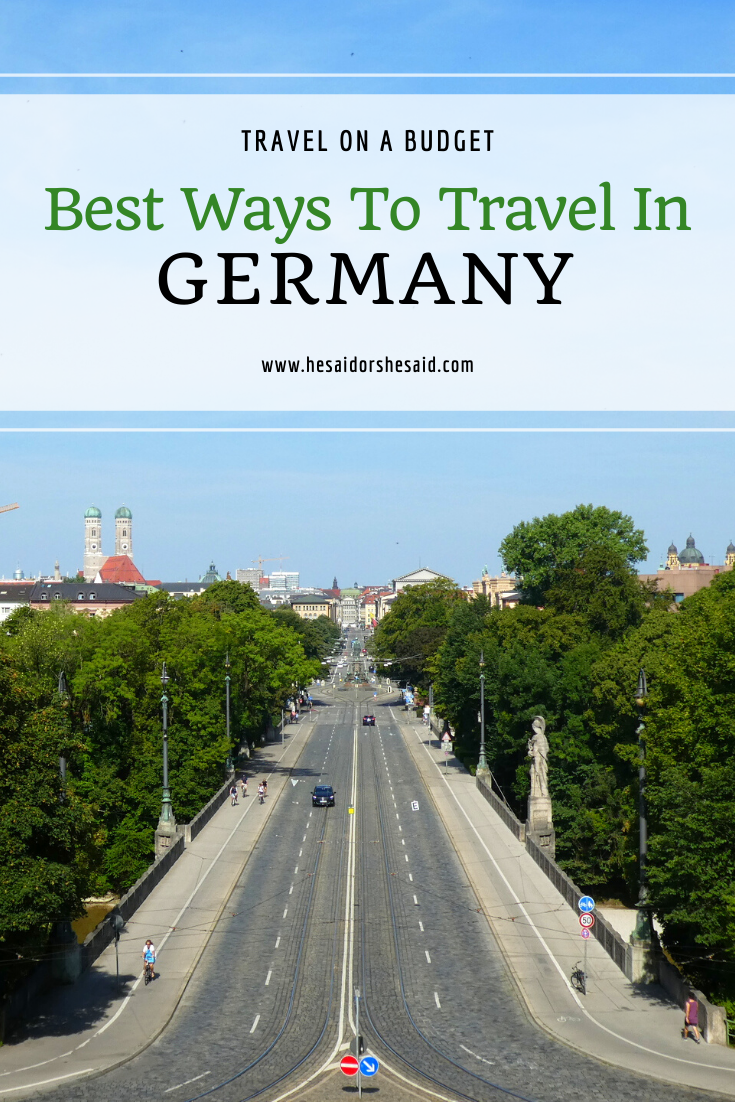If you’ve stumbled upon this article, then chances are you’re planning a trip to Europe and are looking for the best ways to get around Germany. One of the biggest mistakes many travelers make when traveling in Europe and in Germany, especially, is buying a Eurail pass or similar. These types of offers are extremely expensive considering the very limited flexibility and travel options they provide. We do not recommend buying these types of passes. With this article, we focus heavily on answering your questions about transportation in Germany and the best ways to travel there. Many of these tips generally apply to most European countries as well.
Germany Transportation Tips in this Article
Renting a Car in Germany
Many travelers, especially North Americans, are used to heavily relying on personal vehicles for getting from point A to point B. Although it is not necessary, a rental car is a convenient and flexible way to travel around Germany and experience the country on your own terms. Just like in any country, you should first familiarize yourself with the local traffic laws and understand what the road signs mean. In this regard, it’s important to know the answer to the following question:
Is there really no speed limit in Germany?
Despite popular belief, Germany does enforce speed limits on almost all roads. There are stretches of the interstate system (Autobahn) without a speed limit, but we cover that in more detail in our article on the speed limit in Germany. Since you will be in a rental car, you can expect an additional fee from the rental car company if are caught speeding in Germany.
Price of Gas in Germany
The price of gas in Germany is another factor to take into consideration when deciding whether or not to rent a car. Gas is quite a bit more expensive in Europe than in most places and Germany is no exception. Depending on location and other factors that influence gas prices, you can expect to pay at least €50 for a full tank of gas in a compact car.
Roads in Germany
The roads in Germany are in excellent condition, so you will not have any trouble getting to where you need to go. If you are taking a route that takes you near a city, then we highly recommend avoiding rush hours as the Autobahn is notorious for traffic jams. Traffic jams can also occur in the middle of the day because of road work, so that is something else to look out for when driving.
Now that you’ve familiarized yourself with everything you need to know about traveling by car in Germany, you may be interested in renting a car and trying out the Autobahn for yourself. As always, we recommend using a rental car price comparison website to find the best deals.
Buses in Germany
You may have heard by now that bus travel is a convenient way to get around Germany. This is true. In fact, there are a number of bus companies that offer affordable rides to destinations all over Europe. Sometimes, you can catch a bus for as little as €5 per person. Here is a short list of our personal favorites:
- Flixbus: Whenever we need to go anywhere within Germany, we always check the Flixbus website to see if they’ve got an offer that will work for us. This is how we found round trip tickets from Koblenz to Freiburg for about €20 and that’s the total for two people! Another added benefit of riding with Flixbus is that they often offer free wifi to their passengers. Whether you want to stay in touch with friends or get some work done, Flixbus can be a convenient choice for you. Please note, however, that free wifi is not a guarantee and, therefore, not always available.
- Flibco: This is a bus company that we mostly associate with airport shuttles, as they often travel between airports while making stops at major bus/train stations along the way. If you’re flying within Europe and going for the cheaper airlines, then there is a good chance you will be landing and taking off at smaller airports. In this case, you may need a bus like Flibco to get you into the city.
Train Travel in Germany
Train travel is one of our most favorite ways to move throughout Germany. It’s cheap, convenient and it gives you the opportunity to take in the countryside, since your eyes don’t have to be focused on the road. Another benefit of train travel is that it allows you to relax; we all know how exhausting travel can be. Before you jump onto the Deutsche Bahn website and freak out about the high prices you see, there are a 3 things you should know:
- The ICE and IC trains are not our recommended mode of train travel in Germany. These trains are very expensive and they are almost always late, which is ironic because ICE literally stands for Intercity Express.
- Regional Express and Regional trains are much cheaper. They are technically slower, as they make more stops, but they are much more affordable and show you a side of Germany that you can’t see from an ICE.
- The tickets get even cheaper! The price per person for taking a regional connection is nothing compared to the low prices you can get with regional offers or group tickets. There is a lot to talk about here, so we will explain this in the next section.
Best Deals on Train Travel in Germany
The best deals on train travel in Germany come in the form of special offers. We don’t mean special offers as in last minute deals or sale events. In fact, we are talking about offers that are available to everyone everyday. There are tons of offers available depending on your situation or where you’re going, but here are our 2 favorite train deals that we use on a regular basis:
- At the time of this writing, the regional ticket is valid for a single person or a group of up to 5 travelers and allows you to take all regional trains and, in many cases, all public buses within the region you are traveling. You can use the ticket between 9 am and 3 am on the following day. (Remember, this ticket is not valid for IC or ICE trains.) For example, if you are traveling in Bavaria (where Munich is located), then you can get the Bavaria ticket. The price of the ticket varies by region, but pricing is very simple. The ticket has a standard minimum price and then generally increases by €8 for each additional traveler—for example:
- For 1 person = €26
- For 2 persons = €34
- For 3 persons = €42
- For 4 persons = €50
- For 5 persons = €58
- At the time of this writing, the day ticket is also valid for either a single person or for a group of up to 5 people. Just like with the regional ticket, the price increases by a fixed amount for each additional passenger traveling on the ticket. Also like with the regional ticket, the day ticket only allows you to travel with regional trains and public buses. Likewise, the ticket is valid between 9 am and 3 am on the following day. The difference is that you can use this ticket to take the train across state borders and usually as far as the first stop in neighboring countries. Pricing for the day ticket is as follows:
- For 1 person = €44
- For 2 persons = €52
- For 3 persons = €60
- For 4 persons = €68
- For 5 persons = €76
There are tons of great deals on train tickets in Germany. If you are unsure which ticket you should purchase to save the most money, contact us, tell us your situation and we’ll be happy to direct you to the right ticket!
So there you have it, everything you need to know about transportation in Germany. Feel free to bookmark this page and ask us any questions you may have when you are ready to start planning your trip to Germany. We’ve been living here for many years (Denise grew up here) and we know all of the ins and outs about transportation in Germany. Aside from that, we love to help people plan their trips and we offer our assistance for free. 🙂
Book Your Trip to Germany
Please accept cookies and reload the page to use our booking tool. 🙂
Did you know? You can support us for free when you book an accommodation through our booking forms and links.









I prefer train travel and I think it is the fastest way to reach your destination. Thanks for sharing the interesting guide.
Hi Ketty, we also really like taking the train. We usually only go for the buses if the train connections aren’t very convenient or if we just really need to save those few extra Euros. 🙂
Great article, outlining all the different ways of getting around.
I personally prefer busses to trains most of the time. If you want to go a longer distance, regional trains can be a pain because it takes ages to get anywhere. Yes, busses aren’t that fast either but so far, I’ve found them easier to use and more reliable (especially since we live in Frankfurt and we have lots of direct bus connections to wherever we want to go). If I want to go from here to Düsseldorf, trains take 4 hours and I have to change trains two or three times. Buses leave regularly, go there directly (no missed connections) and take less time than the train.
That said, if we are travelling in a group or if we want to go to multiple places in one day, then we get one of those group tickets for the train. They are a great deal and we’ve used them multiple times before to explore the area.
You are absolutely right. If we know we have to go a really long distance, then we often opt for a bus as well. It’s really a situational thing, so we always check both. 🙂 Thanks for your input! It’s always nice to here how others do things too. 🙂
Hi Rifat,
Thank you for your kind words! We’re really glad you liked the article!
Happy travels!